Skin Cancer Specialist Advice
Home » Conditions » Skin Cancer Specialist Advice
Skin Cancer Is Life Threatening
Not sure about your condition? Get in touch now, there is no reason for you to wait.
Award winning dermatology service, with over 20 years of experience
Short waiting lists, on some occasions offering same week appointments
Safe environment, in Care Quality Commission approved facilities
skin cancer Specialist London
Skin cancer is the commonest form of cancer affecting people in the U.K. and indeed, throughout the world. The commonest varieties, basal cell carcinoma and squamous cell carcinoma are known as non-melanoma skin cancers whilst the third commonest type is malignant melanoma.
People with paler skins present a higher risk of developing skin cancer as they are more vulnerable to damage from the sun’s ultraviolet (UV) rays. Exposure to sunlight is often a major factor in the development of skin cancer, and the number of cases in the U.K. is on the rise, despite highly publicised warnings against excessive tanning.
WHAT CAUSES SKIN CANCER?
Exposure to sunlight is the most well known cause of skin cancer. The number of cases of skin cancer is on the rise, despite years of warning against excessive tanning and the dangers of sunbeds. People with paler skin (Fitzpatrick skin types 1-3) are at a higher risk of developing skin cancer as they are more vulnerable to damage from the sun’s ultraviolet (UV) rays.
You are also at an increased risk of skin cancer (melanoma), if you have a large number of moles. It is important to monitor any unusual shaped moles which are over 5mm. If you have concerns about a mole on your body, book in a mole check with one of our experienced consultants.
WHAT DOES SKIN CANCER LOOK LIKE?
Non-melanoma skin cancers are generally slow to develop or spread, while melanoma can be much more aggressive and therefore poses a greater threat. It is always a good idea to keep an eye on any moles on the skin, as the signs of malignant melanoma will usually manifest themselves as changes in the appearance of moles.
Protecting your skin is, of course, always the best course of action, but if your skin has already been damaged by the sun and presents some changes that you find worrying, make sure you seek professional advice. If you are looking for a private skin cancer clinic, London’s Harley Street Dermatology Clinic can offer you a consultation and if necessary, treatment. Our clinical director has undertaken and published research on the subject, and it remains one of his specialist areas.
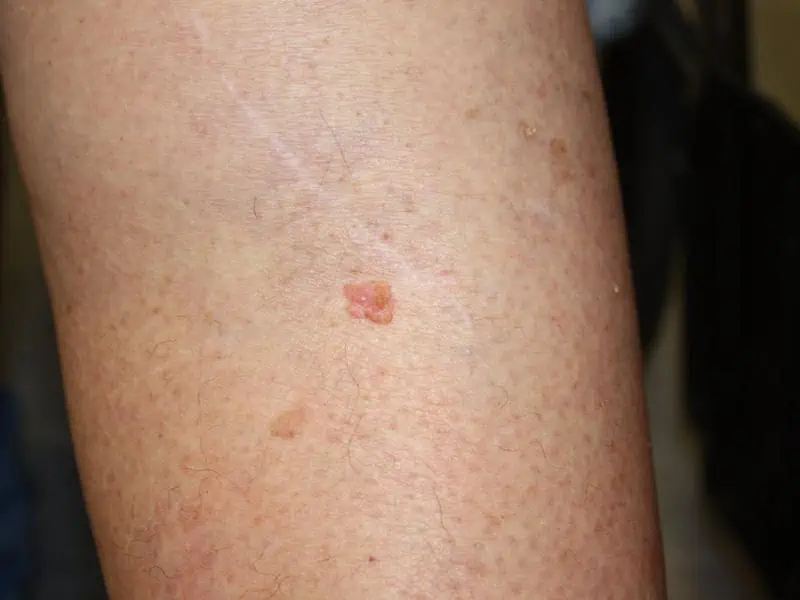
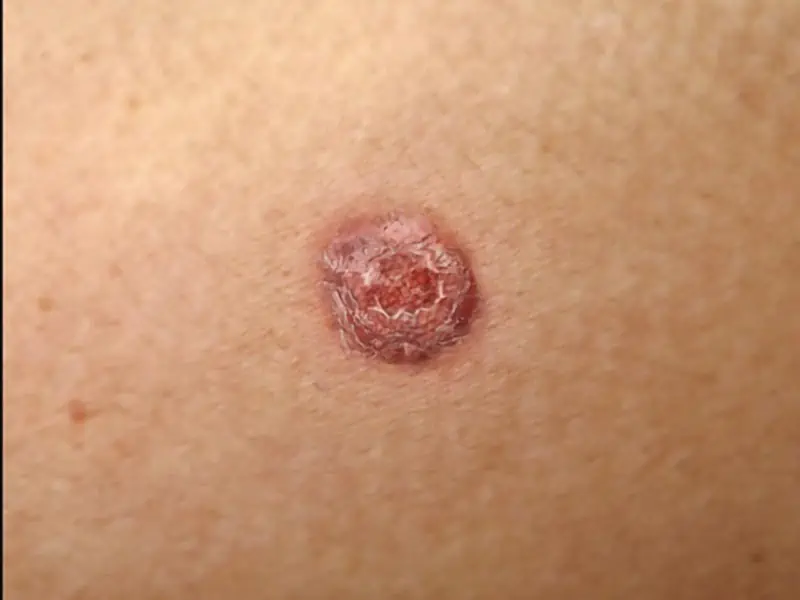
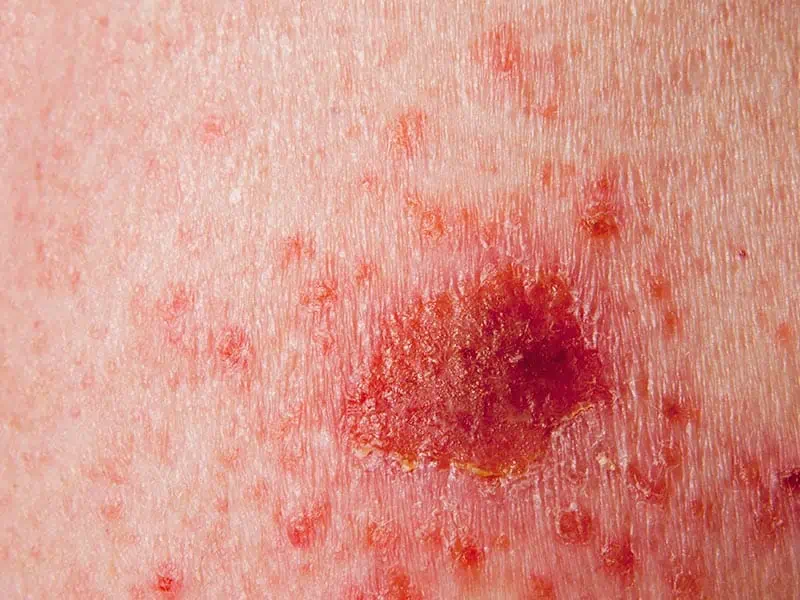
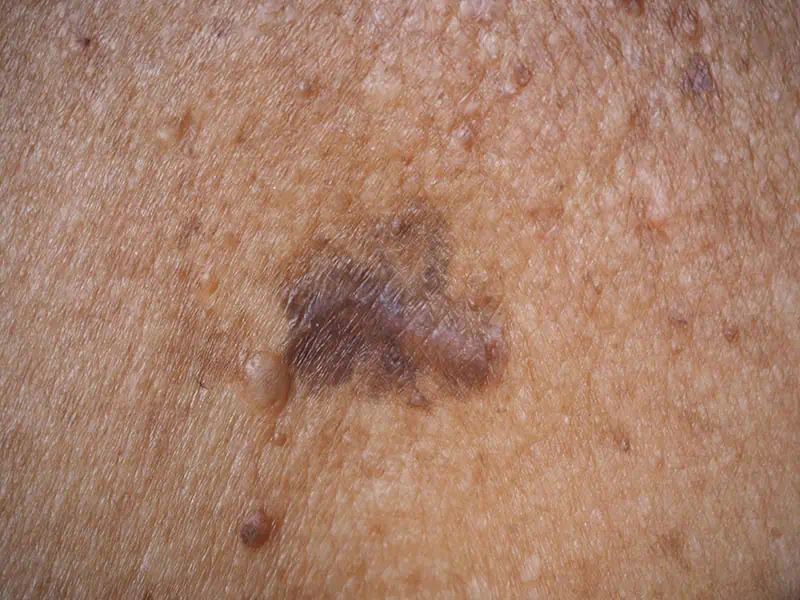
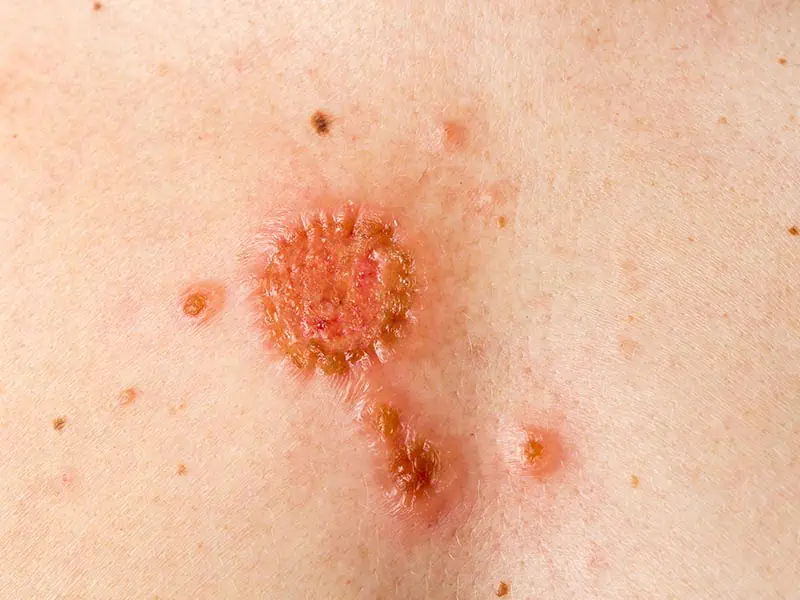
HOW CAN SKIN CANCER BE TREATED?
The treatment you are offered will depend on the type of skin cancer you have, the location of the lesion and how developed it is. You will be required to attend a consultation with a consultant dermatologist who will assess your skin and advise on the best course of treatment. Common Skin Cancer treatments include:
- Micrographic Surgery (MOHS)
- Surgical excision
- Curettage and electrocautery
- Cryotherapy
- Anti-Cancer Creams
- Photodynamic Therapy (PDT)
If it is identified that you do have skin cancer and treatment is needed, the Harley Street Dermatology clinic offers a range of treatment options which will be discussed with you during your consultation. Skin cancer can be removed surgically under local anaesthetic with the most common dermatological surgeries to treat skin cancer being MOHS, Excision, and Curretage and Electrocautery. There are also a number of non-surgical skin cancer treatments on offer, these include photodynamic therapy, topical creams and Cryotherapy.
FREQUENTLY ASKED QUESTIONS
IS SKIN CANCER HEREDITARY?
Skin cancer is not hereditary in the sense that it is passed down through a gene. However, skin type does run in families so those more likely to develop skin cancer are often in the same family.
WHO IS MOST AT RISK OF GETTING SKIN CANCER?
Men are more likely than women to develop skin cancer and it is more common in the elderly.
WHAT FACTOR SUN CREAM SHOULD I USE?
It is recommended to use a high factor of sunscreen no matter your skin type. SPF30 with a 4-star UVA rating during the summer is recommended for those with paler skin to stop burning but also to help prevent wrinkles and sunspots in those who don’t burn as easily.
DO SUNBEDS CAUSE SKIN CANCER?
Research shows sun beds are a significant risk factor in skin cancer.
HOW CAN I PREVENT DEVELOPING SKIN CANCER?
Protecting your skin is, of course, always the best course of action. The easiest ways you can do this include:
- Wearing a waterproof, high level of SPF protection when in the sun
- Use a daily moisturiser with SPF protection
- Avoid the sun when it is at its strongest during the day
- Wear a hat when in the sun
- Sit in the shade
HEAR FROM OUR PATIENTS
Start Your Journey With Us
Please fill in this form and one of our team will give you a call back to arrange a consultation with one of our expert dermatologists.
WHY TREAT YOUR SKIN CANCER AT The Harley Street DERMATOLOGY CLINIC?
Having the right dermatologist is important especially when you have a chronic skin condition that will require ongoing treatment. We want you to feel confident that we’re providing you with the best possible care. We also want you to feel as comfortable as possible with your dermatologist.
The Harley Street Dermatology Clinic specialises in conditions affecting the skin, hair and nails. Our goal is to provide all the care that you need when you’re experiencing these kinds of problems. We want to make it easy for you to access the best quality treatment and support in London.
The clinic is conveniently located in Central London, so it’s easy to visit us if you need to see a dermatologist. You will find yourself in a very comfortable and welcoming environment. We have created a relaxing space where you will receive the highest quality of care. We are regulated by the Care Quality Commission, are part of the British Association of Dermatologists and are top rated by patients of Doctify so you can be sure of safe and effective treatment with us.
SKIN CANCER INSIGHTS AND ADVICE

Ask The Expert: Sun Damage
WHAT DO I DO IF I BURN MY SKIN? Ideally, with the right high SPF sun cream and caution, sunburn can be avoided completely. However, in cases where sunburn happens, it is important to begin treating as soon as possible and get out of the

Worried about a mole?
A mole is a coloured spot on the skin which is made up of a cluster of cells known as melanocytes which are responsible for producing the pigment in your skin. Sometimes these melanocytes grow in a cluster instead of being spread out which results
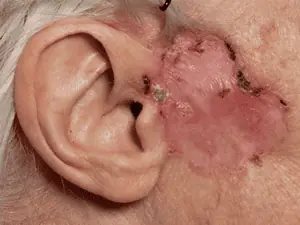
Is BCC (Basal Cell Carcinoma) a Completely Curable Disease? How?
You might not have heard of Basal Cell Carcinoma before, but it is actually the most common form of skin cancer in the UK. About 80% of the people who are diagnosed with skin cancer every year have a BCC. If you are diagnosed with









